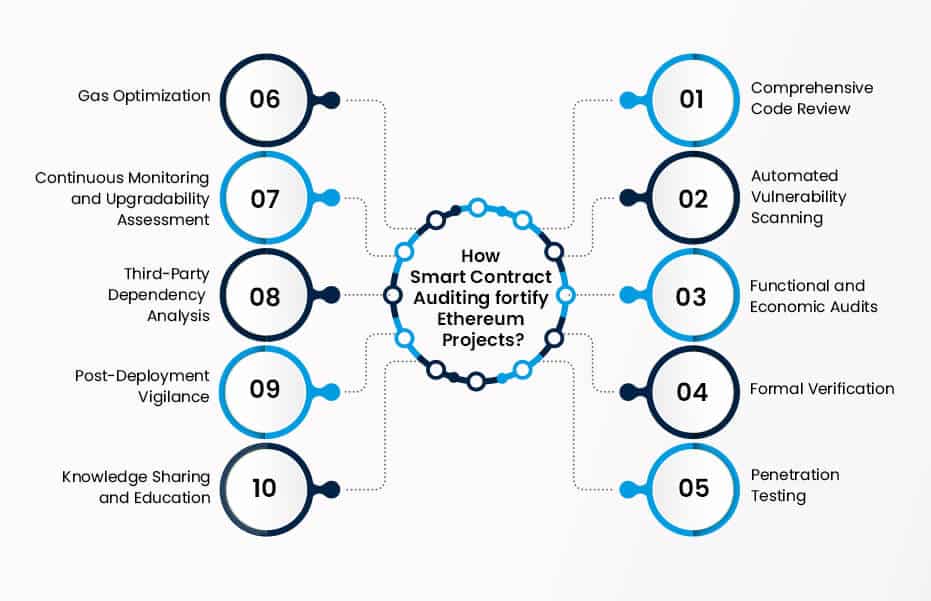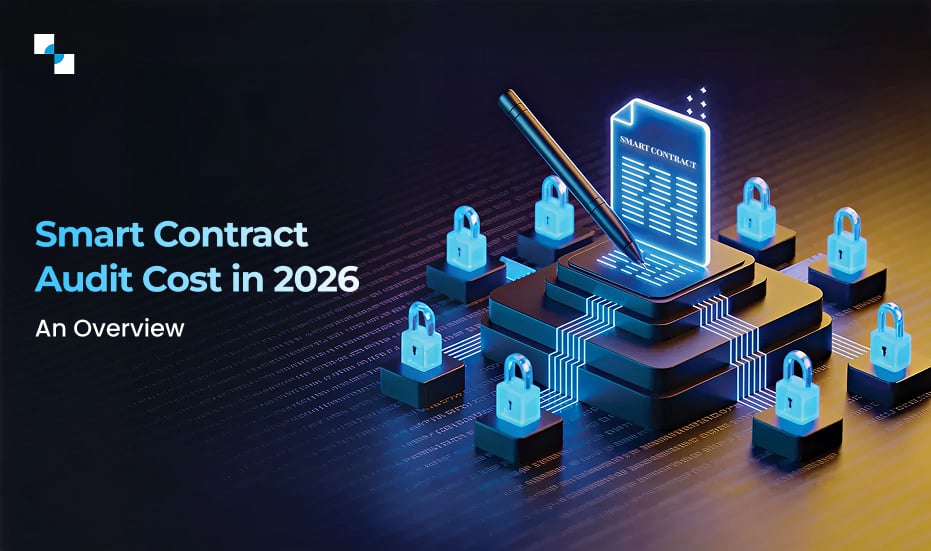The Ethereum blockchain has remained a backbone of decentralized applications and smart contracts since its inception. However, it has witnessed its share of high-profile security breaches. These incidents, while devastating for victims, have served as stark reminders of the importance of robust security measures within the decentralized landscape. From the infamous DAO hack to the Poly Network exploit, these events have highlighted the critical need for meticulous development practices, comprehensive Ethereum smart contract audit, and constant vigilance.
Notable Ethereum Hacks and Their Impact
The DAO Hack (2016)
One of the earliest and most infamous Ethereum hacks occurred in 2016 when an attacker exploited a vulnerability in The DAO smart contract. By manipulating a recursive call bug, the hacker drained approximately 3.6 million ETH, worth around $50 million at the time. This incident led to a contentious hard fork of the Ethereum blockchain, resulting in the creation of Ethereum Classic (ETC). This event served as a wake-up call for developers and the wider community, emphasizing the paramount importance of Ethereum smart contract auditing before deployment.
Lesson
The DAO hack underscored the importance of rigorous testing and code reviews. It highlighted that even seemingly minor vulnerabilities could have catastrophic consequences when dealing with high-value smart contracts.
Parity Multisig Wallet Hack (2017)
In 2017, a vulnerability in Parity’s multisignature wallet contract allowed an attacker to steal over 150,000 ETH (around $30 million). The hack exploited a flaw in the contract’s initialization process, enabling the attacker to claim ownership and withdraw funds from affected wallets.
Lesson
This incident emphasized the need for secure coding practices, particularly when dealing with complex functionality like multisignature wallets. It also highlighted the importance of properly initializing contract variables and implementing robust access controls. Always review the codes before making them live. This is what Ethereum smart contract audit services are expected to do.
The PolyNetwork Hack (2021)
In August 2021, the PolyNetwork, a cross-chain DeFi platform, suffered a major hack resulting in the theft of over $600 million worth of assets across multiple blockchains, including Ethereum. The attacker exploited a vulnerability in the contract that allowed them to bypass the verification process and execute transactions with inflated privileges.
Lesson
The PolyNetwork hack demonstrated the interconnected nature of modern DeFi protocols and the cascading effects that a single vulnerability can have across multiple chains. It reinforced the need for comprehensive security audits that consider cross-chain interactions and complex system architectures. If you are indulging in anything big, don’t forget to hire a reputed Ethereum smart contract audit services company to ensure the safety of your upcoming venture.
The Wormhole Bridge Hack (2022)
February 2022 witnessed the Wormhole bridge hack, where an attacker exploited a vulnerability in the bridge’s smart contract to mint 120,000 wETH (wrapped Ethereum) on the Solana blockchain without proper collateralization. This resulted in a $320 million loss, impacting both the Ethereum and Solana ecosystems.
Lesson
The Wormhole incident highlighted the critical importance of securing cross-chain bridges, which have become prime targets for attackers. It underscored the need for redundant verification mechanisms and the risks associated with centralized components in decentralized systems.
Ethereum Smart Contract Auditing: A Shield Against Vulnerabilities
These high-profile hacks have been painful but invaluable learning experiences for the Ethereum community. They have catalyzed a growing emphasis on security and the pivotal role of Ethereum smart contract auditing in safeguarding DeFi protocols. Ethereum smart contract auditing serves as a proactive shield, identifying and mitigating vulnerabilities before they can be exploited.
How Smart Contract Auditing fortify Ethereum Projects?

Comprehensive Code Review
Experienced auditors from a seasoned Ethereum smart contract audit services company meticulously examine every line of smart contract code, searching for potential security flaws, logic errors, and deviations from best practices. This human-driven analysis is crucial for uncovering subtle vulnerabilities that automated tools might miss.
Automated Vulnerability Scanning
Ethereum smart contract audit services employ advanced tools to scan smart contracts for known vulnerabilities, insecure patterns, and compliance with established security standards. These scans can quickly identify common pitfalls and provide a baseline for further investigation.
Functional and Economic Audits
Beyond code-level security, Ethereum smart contract auditing experts assess whether smart contracts behave as intended under various scenarios. They also evaluate the economic models underpinning DeFi protocols, ensuring that incentives are properly aligned and resistant to manipulation.
Formal Verification
For critical smart contracts, formal verification techniques may be applied. This mathematical approach proves or disproves the correctness of algorithms with respect to certain specifications, offering a higher degree of assurance.
Penetration Testing
Ethical hackers attempt to exploit the smart contracts in controlled environments, simulating real-world attack scenarios. This process helps uncover vulnerabilities that might only become apparent under specific conditions or when contracts interact with external systems.
Gas Optimization
Ethereum smart contract audit service providers analyze the gas consumption of smart contracts, optimizing for efficiency while maintaining security. Efficient gas usage not only reduces transaction costs but also mitigates potential denial-of-service attacks.
Continuous Monitoring and Upgradability Assessment
Given the immutable nature of deployed smart contracts, auditors evaluate upgrade mechanisms and governance structures. They ensure that protocols can be safely updated to address newly discovered vulnerabilities while maintaining decentralization.
Third-Party Dependency Analysis
Many DeFi protocols rely on external libraries and oracles. Ethereum smart contract audit services scrutinize these dependencies, verifying their security and assessing the risks associated with their integration.
Post-Deployment Vigilance
Ethereum smart contract auditing doesn’t end at deployment. Continuous monitoring for suspicious activities, regular re-audits, and bug bounty programs are essential for maintaining long-term security.
Knowledge Sharing and Education
Auditors contribute to the broader Ethereum ecosystem by publishing detailed reports, sharing insights on common vulnerabilities, and educating developers on secure coding practices.

The Road Ahead: Building a Secure DeFi Ecosystem
Despite the sophistication of modern Ethereum smart contract auditing, it’s crucial to recognize that no system is completely invulnerable. The dynamic nature of blockchain technology, coupled with the ingenuity of attackers, means that security must be an ongoing, collaborative effort.
Projects should adopt a “defense in depth” strategy, combining thorough audits with other security measures such as:
- Implementing timelocks and multisignature schemes for high-value transactions.
- Gradually rolling out new features with limits on total value locked (TVL).
- Fostering a security-first culture among development teams.
- Engaging with the community for crowdsourced bug discovery and responsible disclosure.
Moreover, users must be educated about the risks inherent in DeFi and encouraged to practice due diligence, diversify their holdings, and avoid unaudited or newly launched protocols.
Conclusion
The lessons learned from high-profile Ethereum hacks have been costly, but they have undeniably strengthened the foundations of DeFi. We need to perform rigorous smart contract auditing to ensure security. Choose Antier, an experienced Ethereum smart contract audit services company smoothens your blockchain journey by mitigating risks associated with smart contracts and automated transactions. We understand the need to safeguard every single hard-earned penny by reviewing the codes of your smart contracts and making them free from possible vulnerabilities. Come, let us shape the future of your blockchain-based venture together.








